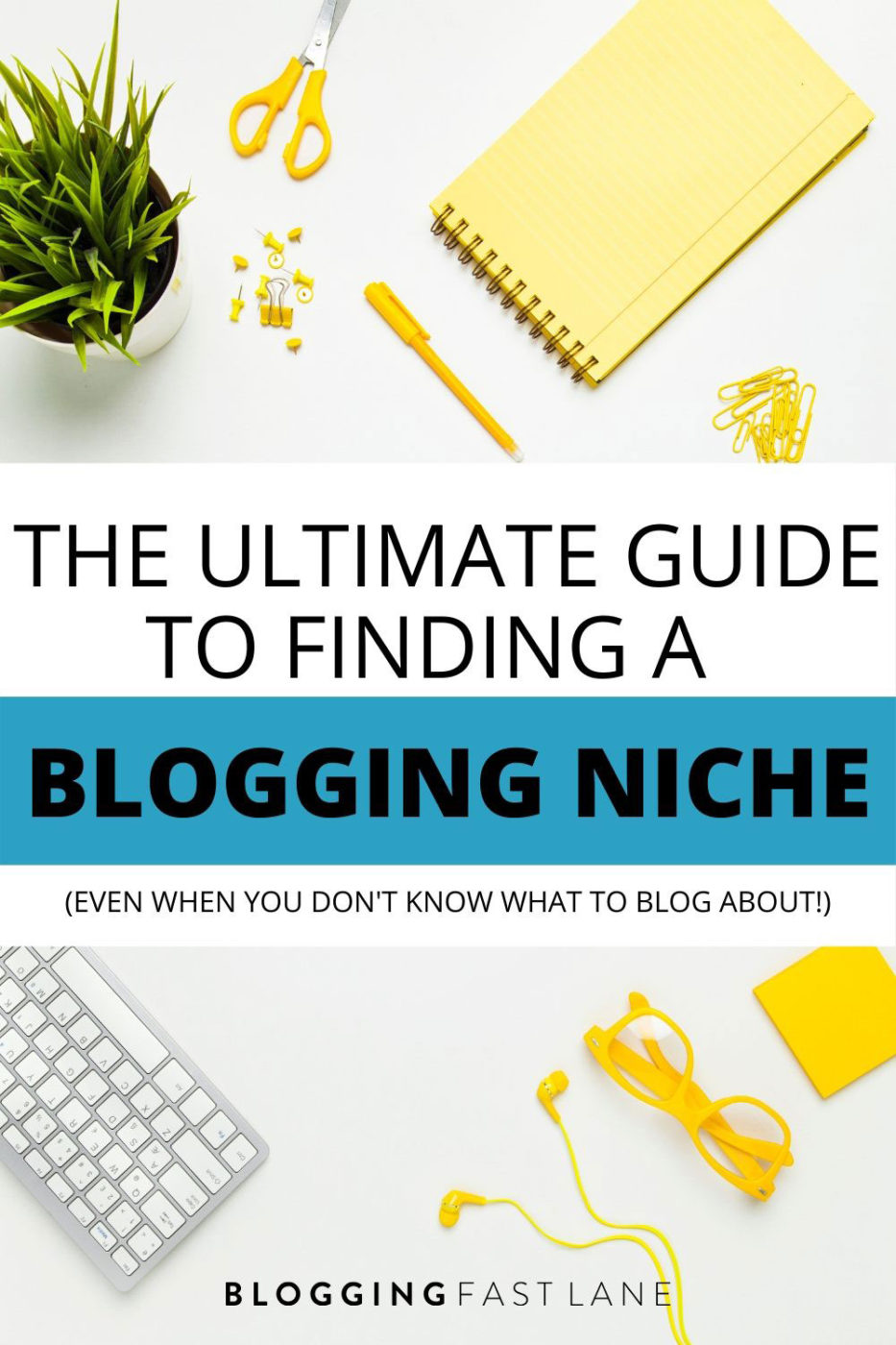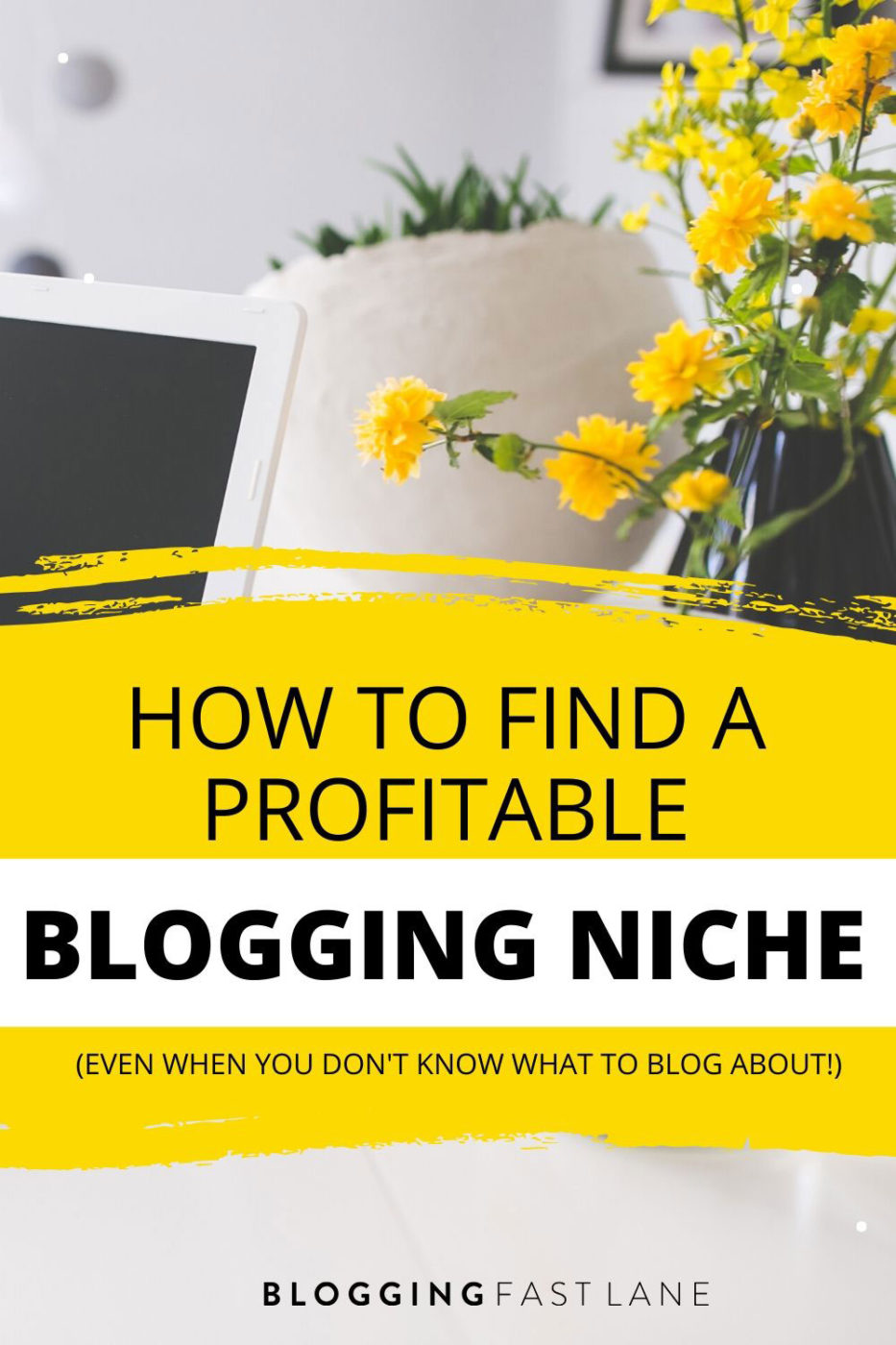This article may contain affiliate / compensated links. For full information, please see our disclaimer here.

Have you ever wanted to start a blog but just don’t know exactly WHAT to blog about? Or maybe you have a ton of ideas about what to blog about but you’re just not sure if it will work for you.
Don’t worry, you’re in the right place!
Over the last two years, we have helped thousands of people not only start a blog but also show them how to choose a profitable blogging niche!
In this article, I will walk you through what is a niche, why it’s so important, and our secret sauce (which isn’t that much of a secret anymore) on how to choose the perfect niche to blog about.
I will also give you a few ideas on how to validate your niche to see if you can actually make money from it.
You ready?
Let’s dive in.
What Exactly is a Blog Niche and Why is it So Important?
A blog’s niche is essentially a specific topic that you will be blogging/creating content about.
Umm… but Anna, why do I need to choose one topic? Can’t I just write about anything that comes to mind?
Unfortunately, the old-school style of blogging has been dead for a while now.
This means that diary-style entries of just writing about everything and anything that comes to mind won’t work anymore.
Instead, more and more people are opting to focus on one topic, which allows them to build authority in one subject and grow a tribe a lot faster!
Let me give you an example.
For example, you blog about food, travel, and health.
Some of your readers might be interested in travel but are not interested in the other topics you blog about.
This means that your articles will always be hit or miss. Some articles will be a huge crowd pleaser while others will fall flat.
On the other end of that spectrum, if you choose to blog about a super specific topic like teaching English in Asia, you are 100% certain that everyone who comes to your blog is interested in this topic.
This allows you to tailor-fit your content just for them.
This is so powerful!
Let me ask you something. Have you ever read a blog post where after reading the article, you go, “Oh wow! I felt like that article and information was meant for me!”
In a sense, by focusing on a specific niche and sticking to it, every piece of content that you will write about will hit home for the specific group of people you are speaking to.
Niche selection doesn’t just apply to blogging but to pretty much every business out there.
As this Forbes article puts it:
“Forty-two percent of startups fail, mostly because they ignore the opportunity to capitalize on a niche and don’t actually provide a solution to a problem.”
– Judge Graham, Entrepreneur and Investor
This exact principle applies to blogging.
In order to succeed, you need to be willing to niche down and solve a particular problem for people.
The thing is, the more niche (or specific) your blog is, the better!
We made the mistake of thinking our niche for our travel blog, Adventure in You, was just general adventure travel.
We thought focusing on adventure was niche enough!
It wasn’t until we further niched down and started only writing about specific destinations as well as writing and reviewing adventure holidays did we start to actually see growth.
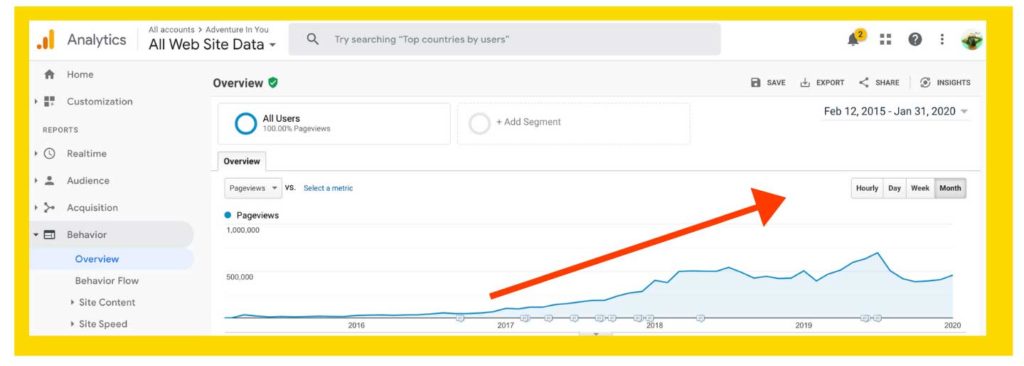
Choosing the right niche for your blog is one of the deciding factors for whether your blog will succeed or not.
But, don’t fret!
In the next section, I will walk you through our strategy to help others get clear on their blog’s direction.
The Blue Ocean Approach to Choosing a Blog Niche
Okay, question time.
How many of you have said: “I want to start a _____________ blog!”
Fill in the blank with any of the words below:
- Travel
- Food
- Gardening
- Health
- Gaming
- Tech
- Lifestyle
Although these topics can be classified as niches by textbook definition, they sadly just aren’t specific enough!
These topics are so broad, so oversaturated that trying to start a new blog (without being specific) about what exactly you want to write about is going to be pretty tough.
You will end up drowning amongst all the other existing blogs in those niches.
Want to learn how to avoid this? Listen up as the strategy below can change your niche selection process.
What is the Blue Ocean Strategy?
Now I know I’ve talked about this before in previous blogs but let me go a bit deeper.
The theory behind the Blue Ocean strategy is simple.
According to this strategy by W. Chan Kim and Renée Mauborgne, in any type of business, there are two types of oceans.
A Blue Ocean and a Red Ocean.
Red Oceans are made up of oversaturated markets that have a lot of competition. They use the analogy that the water is red, due to the cutthroat competition of people competing in these markets.
Blue Oceans, on the other hand, is when you carve out a sub-niche for yourself that is so unique and specific that you essentially create your own space in the market.
Taking this Blue Ocean approach in blogging will allow you to rank your articles faster, attract a loyal tribe, and more importantly, create content that you KNOW your readers will love.
Take a look at the image below.
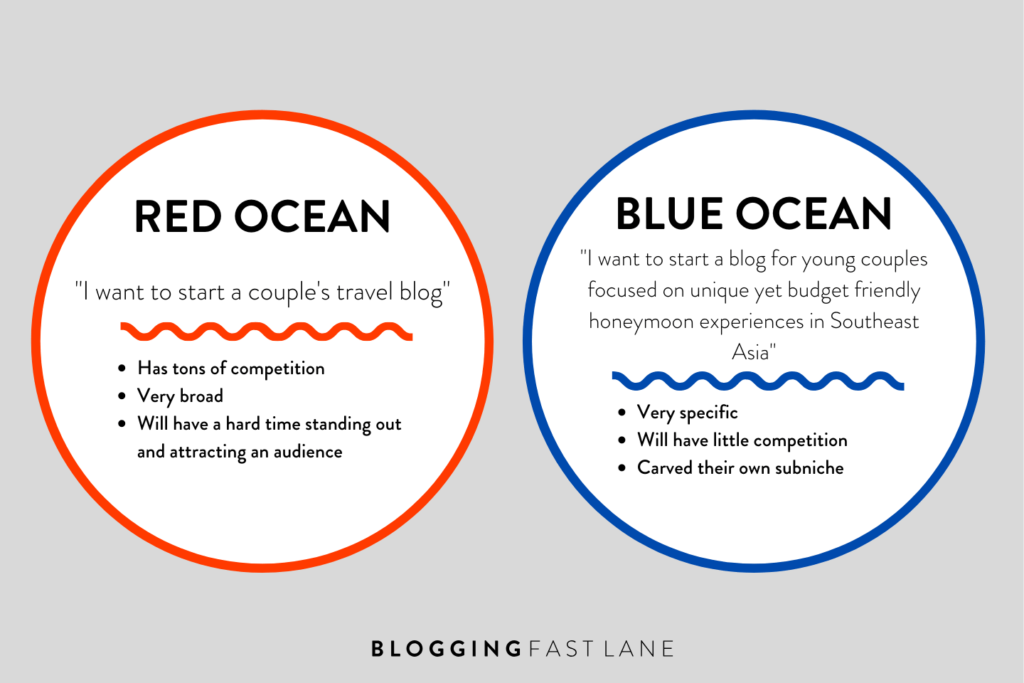
Which blog do you think would be able to gain traction faster and build a loyal following?
Here are a few more examples of specific Blue Oceans in the blogging world.
Can you see the difference?
| Red Ocean | Blue Ocean |
| Parenting blog | Parenting blog focused on how to deal with rebellious teenagers |
| Outdoor Hiking blog | Hiking blog featuring the best outdoor hiking trails in the UK for families |
| Food blog | Budget-friendly one-pot/pan meals for students |
| European Travel blog | Luxury blog for Baby Boomers focused on traveling Greece |
So How Exactly Do You Find Your Blue Ocean?
I could honestly go on for hours on this topic but for the sake of brevity, we’ve come up with a simple framework to help people find their Blue Ocean in the blogging space.
Your Blue Ocean should be an intersection of three things:
1. Your Passion (gardening, recycle crafting, cooking, Latin American culture)
2. Any Unique Skill/Life Experience (I learned Spanish in 3 months, I lost 50 pounds with the keto diet, I am great at budgeting)
3. Your Ideal Audience (for this, you are essentially just brainstorming on WHO your ideal blog reader would be. Get specific on how old they are, what they do, what educational level, etc.)
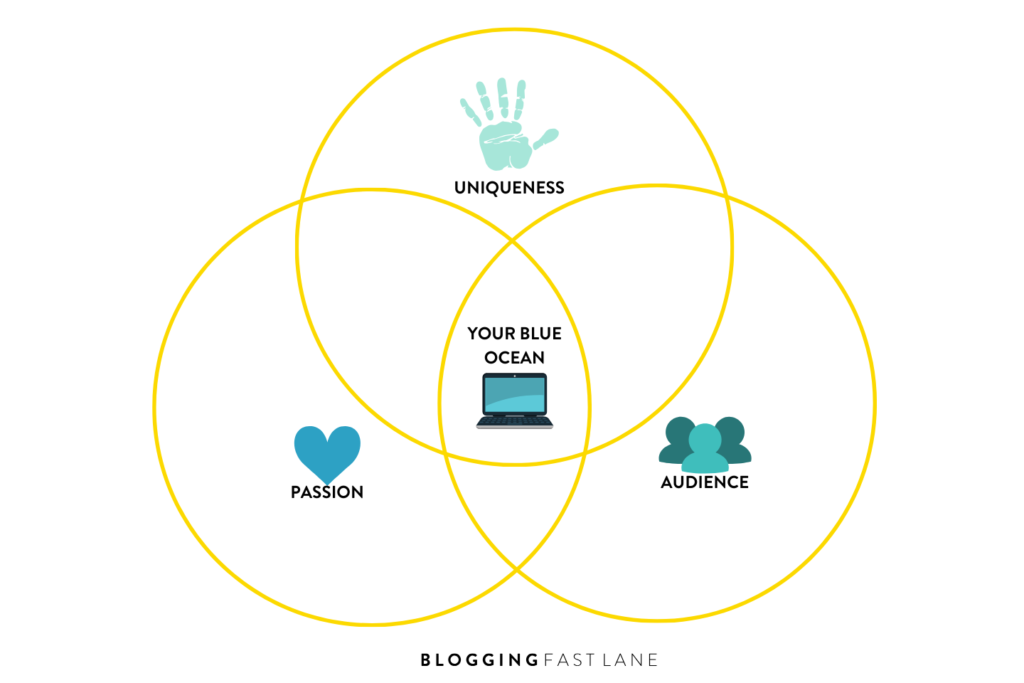
Get a piece of paper, create three columns, brainstorm, and write out as many things underneath each category above.
After you’ve done that, assess if there any intersections between the things you are passionate about and the unique skills or life experiences that you have.
Based on the examples I gave above, here’s an example of my blog’s Blue Ocean.
I want to start a food blog focused on creating only keto/low carb Latin American recipes. My target market would be Latina women who are living abroad and want to recreate recipes from their childhood despite being on a low carb diet.
Yes, I know there are tons of diet food blogs out there… but how many of them do you think are this specific about who they are catering to and the type of cuisine they focus on?
If you want more examples on how to find your Blue Ocean, make sure you attend our free training where we walk you through the exact process I laid out and more! When you attend, you’ll even get a free workbook to help you dive deeper into this exercise.
Now, it is important to point out that there are a lot of people who include profitability in their niche selection process.
While we think considering the profitability of a niche is important, finding a topic and a unique way to approach it is even more crucial.
People who chase niche profitability will eventually get tired of creating content that they are not 100% passionate while people with clear Blue Oceans will continue to flourish as they speak from a place of passion and purpose.
Later in this article, I will go into detail on how you can gauge a niche’s profitability and also give you a few examples of lucrative niches that are working really well.
4 Questions to Ask Yourself About Your Possible Niche
Hopefully, after the mini exercise above, you now are toying with a few possible Blue Ocean blogging niches.
Now, it’s time to roll up your sleeves and ask yourself these questions.
1. Am I REALLY Passionate About This Topic?
When it comes to blogging, people say that a good exercise to make sure you are truly interested/knowledgeable about a topic is to make a list of 50 to 100 article ideas around that topic.
Although I don’t really recommend people actually doing this (the content you create should be based on keyword research and not off-the-cuff ideas), the concept behind it is great.
It forces you to ask yourself: am I really passionate enough to write about this topic over and over again?
As mentioned above, I NEVER recommend that you choose a blogging niche on the premise that it has a high potential to make money (more on this later!).
Passion over profit — always!
Your knowledge, passion, and interest in a topic will show in the content that you create so you want to make sure you choose a topic you love.
Creating engaging content is hard enough. Try doing that for a topic you’re not 100% passionate about. And how can you expect to become an authority on a particular topic if you’re not 100% interested in it?
Remember: blogging is a marathon and not a sprint.
2. Are People Interested in This Topic? (Tips on How to Validate Your Idea)
We get emails all the time from our students asking questions like:
- “Is this too specific?
- “Will people be interested in my blue ocean?”
- “How do I know this will work?”
A little bit of basic market research will help you gauge and understand if people are actually interested in your blog’s niche.
Here are 4 tips on how you can validate your idea.
Check Google Trends
Use Google Trends to find out if there is general interest around your particular topic. Is there a rise or fall in the keywords associated with your niche over time?
All you have to do is input a few keywords (words that you will normally associate with your topic), and it will give you a snapshot of the general trend around this search term.
Tip: Check for synonyms/alternative keywords around your niche to see if this changes the results. (ie. check for keto diet, low carb diet, ketogenic diet, spanish keto recipes)
Here’s how you can assess the potential keywords, based on the example blog niche I mentioned above.
Image 1: Google Trends result for the word: Low Carb
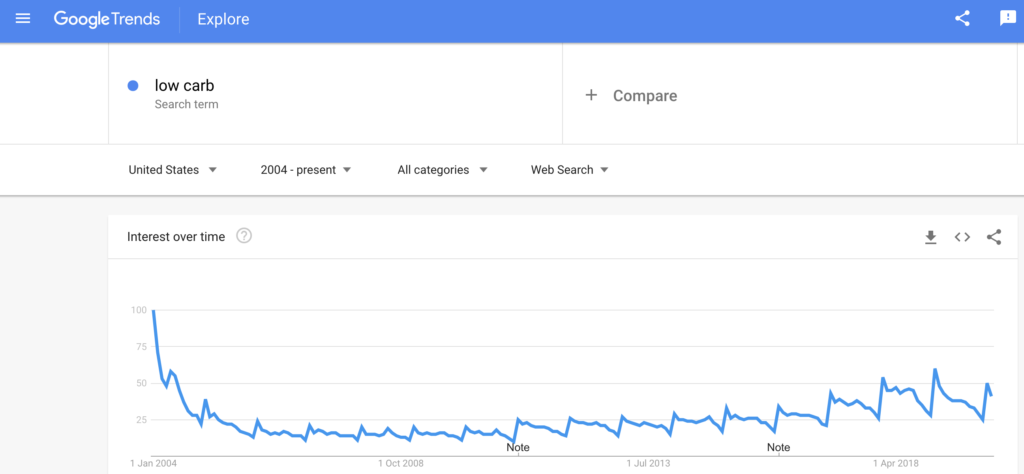
Image 2: Google Trends result for the word: Keto
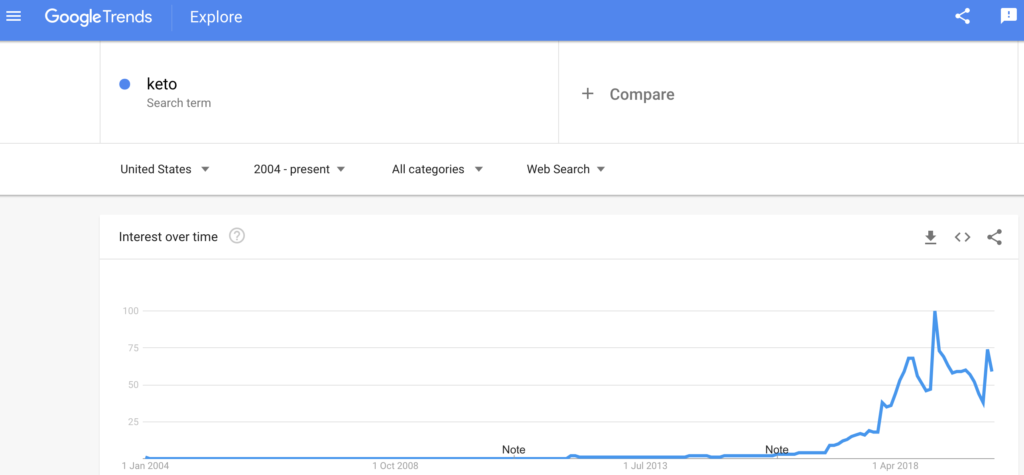
Based on the data above, I know that the word “keto” has a larger buzz compared to the word “low carb”.
This means that when choosing my ideal keywords for my blog, the word “keto” might gain more traction than having the word “low carb” in my blog’s niche.
Use Google Suggest
Another way to get a rough idea of what people are searching for is by making use of Google’s own learning algorithm which auto-suggests keywords.
If you go to Google and start typing your ideal keyword, it will automatically suggest a few other search terms which are based on the keywords that people relate to your topic.
If you have a long list of possible keywords associated with your Blue Ocean, this means there is a big interest around your chosen niche.
See the keywords in the suggest box below? All of these suggest that there is a large interest in your topic!

Do Basic Keyword Research
Although keyword research sounds intimidating, it’s actually pretty simple and is one of the core components of succeeding as a blogger.
In our Blogging Fast Lane Accelerator program, we train our students on all our keyword research techniques plus provide recommendations on all our favorite tools so they can get those articles ranking!
For this particular case though, I recommend using Uber Suggest which is a free keyword research tool. Although the results won’t be 100% accurate, it is still a good starting-off point.
Try playing around with different keyword combinations to give you a general idea of how many people are searching for that particular keyword.
You can also use a few of the keyword suggestions from Google Suggest to help you think of possible keywords to research.
Note: Don’t get too discouraged if you can’t find any high traffic keywords. Usually, the more niche you are, the lower the search volume. The plus side of this is that competition is low!
Although your keywords might have a low volume, due to the lack of competition, you might also be able to rank for hundreds of different variations for this particular keyword as well.
A good tip would be to list out at least 20 to 30 keywords and total up the projected traffic that you can get for all of them. If it reaches a combined search volume of over 10,000, then you have yourself a pretty good niche.
Check out Pinterest
I love Pinterest and think it is a great platform to get an overview of current trends and what people are searching for.
I would recommend logging on to Pinterest and using their search bar as if it was Google Suggest.
Type out a few keywords and see what/who comes up. From the results, you can also click through to other blogs which will hopefully give you an idea of the blogs you would be competing with and the type of content they produce.
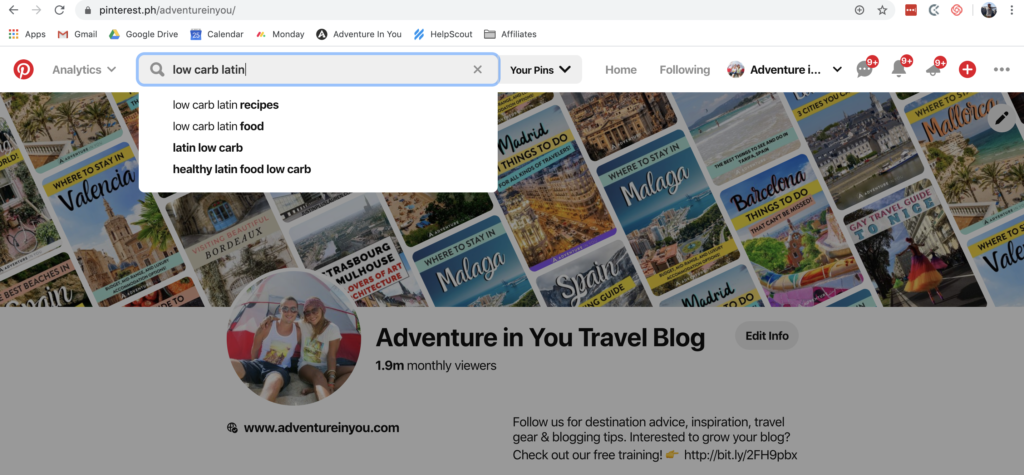
3. How Competitive is My Blue Ocean?
Done figuring out if there’s enough demand for your blog niche? This now brings me to the topic of competitiveness.
A good way to figure out how competitive a market really is is by the number of similar blogs out there.
Hopefully, if you’ve followed the exercises above on how to find your Blue Ocean, then you shouldn’t be dealing with this particular question too much as you are essentially carving out your own sub-niche.
Finding a way to stand out by doing a spin-off on a topic is essential to your success.
Before we move on from this, I need to stress that competition amongst blogs is not always a bad thing.
Coming from someone who essentially trains and helps other bloggers build successful blogs, our motto is always: Community Over Competition.
Yes, you might be talking about the same topics, but your followers will follow YOU for your voice, your knowledge, and your opinions.
In fact, when we first started our travel blog, we spent a large portion of our time guest posting for other travel blogs (all in similar niches).
This allowed us to build authority to our site and also gain interest from potential readers who were interested in that particular topic.
If you are entering a competitive market but you are sure that you are able to stand out by adding your own spin to a topic, then go for it!
This is essentially what finding your Blue Ocean is all about.
On the other hand, if there is no competition, revert back to basic keyword research and Google Trends to re-evaluate if there is a big enough audience for your selected niche.
4. Does My Niche Have Longevity?
This brings me to my fourth question which is all about the longevity of your chosen niche.
What do I mean by this?
Let me give you an example.
I had a friend who started a blog about getting over a break-up and being single. Eventually, she met the perfect man for her and is now in a happy and thriving relationship.
Although she wants to continue working on her blog because it still brings her a good amount of passive income, she no longer feels like she could be a figure of authority.
Please note that I am definitely not against choosing blog topics that can potentially change in the future. Instead, just consider that circumstances may change — so you want to make sure that the topic you choose has good longevity for you on a personal level.
The second application of longevity is around choosing “timeless niches”.
Parenting, food, health, fitness, technology, education, language learning, etc. are all examples of (broad) niches that have longevity.
Finding sub-niches within these topics would be a good idea versus news sites, current events, relationship statuses, etc.
If you can see yourself growing with your niche, even better!
For example, when we first started Adventure in You, we wrote about budget adventure travel because this was how we used to travel.
Soon, we outgrew this travel style and started to focus on large adventure holidays as this is what we naturally gravitated to as we grew older.
Here’s a photo of us from when we participated in an epic 10-day tuk-tuk race all over Sri Lanka.

When choosing a blogging niche, having the concept of longevity in mind right from the start is pretty important!
How Do I Know if My Niche is Profitable?
If you’ve read this article all the way to this point, it’s time to address the elephant in the room. (I promise it’s a coincidence that the photo above is actually of an elephant!)
How do I know if the blog niche I choose will make me money?
Personally, after growing and monetizing a travel blog to over six-figures, I realized that there are tons of ways to monetize and make money from a blog.
In our interview with Foundr, we share how we started our blog with $60 and eventually grew it to a point where it regularly makes us $25,000 to $30,000 monthly.

You see, when blogging first started in the 90s, the only way you could make money was by working with brands.
Now, you can earn from ads, affiliate marketing, creating your own products, and more!
The monetization of blogs has simply never been easier.
Naturally, there will be a few Blue Oceans that will be a lot easier to monetize than others but listed below are a few of my top tips to get an idea on a niche’s profitability.
Find Potential Products
In our Blogging Fast Lane course, we mainly teach our students how to monetize their blogs through affiliate marketing.
For those unfamiliar with this concept:
Affiliate marketing is when you promote other companies’ products. When someone buys through your affiliate link, you get a commission.
We love this particular method because we can literally say that we earn money in our sleep!
Our tried and tested FAST Framework shows our students how to build Affiliate Machines that run on autopilot.
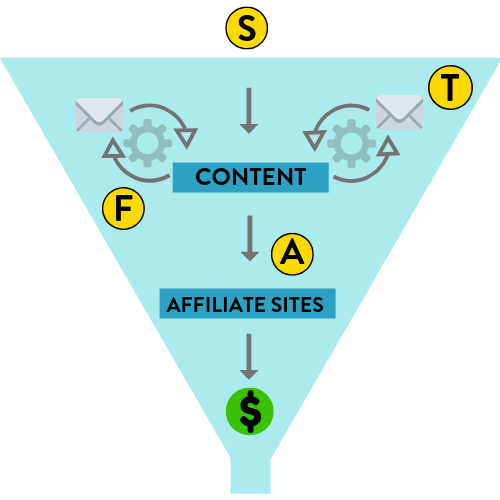
If you want to learn more about it, check out our FREE training where we explain in detail what an Affiliate Machine is, how it works, and how it has exponentially increased our income.
With that in mind, a good way to gauge the profitability of a niche is by taking a look at potential products and services that you can recommend.
If I go with my sample Blue Ocean niche above which is a food blog focused on creating only keto/low carb Latin American recipes, I know for a fact that there are TONS of products and services that I can recommend and later on affiliate.
Take a look at your niche and look for books, products on Amazon, courses, retreats, etc. If you have chosen a super niche and specific Blue Ocean, get a bit creative and research a variety of different options for potential products.
Not sure if a product or service that you love offers an affiliate program?
Simply type the brand name + affiliate program on Google to see if they have a program like this up and running. Here’s what I came up with after a quick Google search; this information indicates niche profitability.
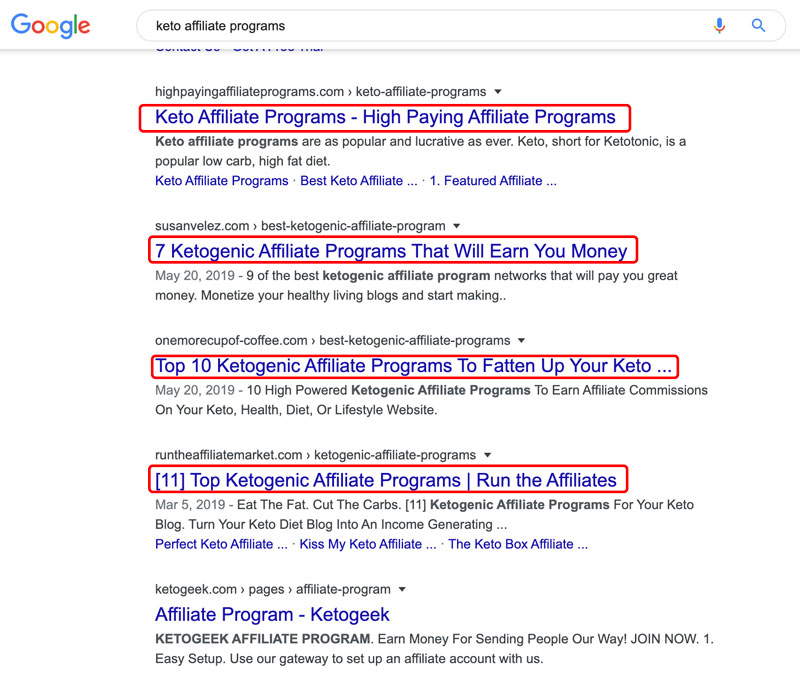
If your niche doesn’t have a lot of affiliate programs that you can join but you can think of one or two products that will be a good fit, don’t worry.
We’ve encountered companies that are willing to work with us on a commission basis even if they don’t have an affiliate program set up. Although we try to avoid this as it involves a lot of manual tracking, it is still possible.
Check What Your Competitors are Doing
A good way to see a niche’s profitability is by checking out your potential competitors.
How are they currently monetizing their blog?
Do they have their own products? Are they recommending any courses? Are they giving away any discount coupons?
By taking a look at what your potential competitors are doing, you will get a better idea of how profitable your niche is and how you can monetize later on.
If you do not find a lot of monetization possibilities, don’t give up on your niche just yet. If there is a gap in the market which you can fill, you can also look into creating your own products such as ebooks, courses, programs, etc.

Check Ad Results on Google
Another nifty way to get an idea of niche profitability is to type in a few keywords in Google. Then, take a look at the ad results listed before the SERPS.
If there are a few ads on the first page, this means that there is money to be made in this niche as large companies themselves are willing to pay for traffic (PPC ads) just to get pageviews.
Observing which companies are bidding for ads is also a great way to get more ideas on potential products and services that you can recommend to users (once you’ve tried them, of course!).
Choosing a Blog Niche Will Set You Up for Success
Nowadays, due to the amount of competition, choosing a blog’s niche is more important than ever.
However, this is a good thing.
This means that the age of dedicated, authoritative blogs is now here, and people just like yourself who are knowledgeable about a topic and have a unique voice can shine.
If you follow the steps outlined in this article on how to choose a Blue Ocean and assess if there’s a demand for what you want to blog about, you are already a step ahead of the rest!
Hopefully, this article has given you actionable steps on how to find a profitable niche for your blog and you are now ready to take that leap.
Need help more guidance? Don’t forget to check out our free training! We dish out tons of actionable advice on how to find clarity in your Blue Ocean, which includes fillable workbooks and more.
Like this Article? Pin it!
